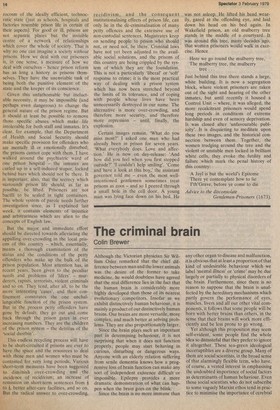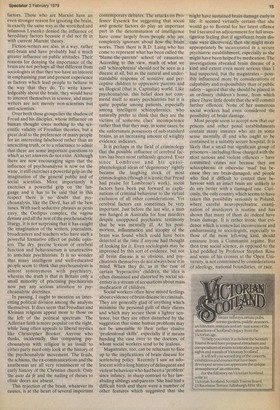The criminal brain
Colin Brewer
Although the Victorian physician Sir William Osier remarked that the chief difference between man and the lower animals was the desire of the former to take medicine, he would doubtless have agreed that the real difference lies in the fact that the human brain is considerably more highly developed than those of its nearest evolutionary competitors. Insofar as we exhibit distinctively human behaviour, it is mainly a product of our distinctively human brains. Our brains are more versatile, more complex, and much better at solving problems. They are also proportionately larger.
Since the brain plays such an important part in determining behaviour, it is not surprising that when it does not function properly, people may start behaving in curious, disturbing or dangerous ways. Anyone with an elderly relation suffering from senile dementia knows how a progressive loss of brain function can make any sort of independent existence difficult or impossible. Epilepsy provides a more dramatic demonstration of what can happen when the brain goes on the blink.
Since the brain is no more immune than any other organ to disease and malfunction, it is obvious that at least a proportion of that kind of undesirable behaviour which we label 'mental illness' or 'crime' may be due largely or partially to physical disorders of the brain. Furthermore, since there is no reason to suppose that the brain is unaffected by the hereditary mechanisms which partly govern the performance of eyes, muscles, livers and all our other vital components, it follows that some people will be born with better brains than others, in the sense that their brains will work more efficiently and be less prone to go wrong.
Yet although this proposition may seem self-evident, some people find the whole idea so distasteful that they prefer to ignore it altogether. These sea-green ideological incorruptibles are a diverse group. Many of them are social scientists, in the broad sense of that alarmingly flexible term, who have, of course, a vested interest in emphasising the undoubted importance of social factors as determinants of human behaviour. Even those social scientists who do not subscribe to some vaguely Marxist ethos tend in practice to minimise the importance of cerebral factors. Those who are Marxist have an even stronger reason for ignoring the brain, in exactly the same way as the wretched and infamous Lysenko denied the influence of hereditary factors because it did not fit in with current Marxist theory.
Fiction-writers are also, in a way, rather anti-brain and have probably had a much greater influence on public attitudes. Their reasons for denying the importance of the brain are not perhaps all that different from sociologists in that they too have an interest in emphasising past and present experience as factors which lead people to behave in the way that they do. To write knowledgeably about the brain, they would have to interest themselves in science, and many writers are not merely non-scientists but anti-scientists.
Over both these groups lies the shadow of Freud and his disciples, whose influence on human thought owes nothing to the scientific validity of Freudian theories, but a great deal to the preference of many people for an interesting falsehood rather than an unexciting truth, or to a reluctance to admit that there are some important questions to which as yet answers do not exist. Although there are now encouraging signs that the influence of psychoanalysis is now on the wane, it still exercises a powerful grip on the imagination of the general public and of social scientists. More importantly it exercises a powerful grip on the language and it has to be said that in this respect there is no doubt that psychoanalysis, like the Devil, has all the best tunes. With such seductive phrases as penis envy, the Oedipus complex, the vagina dentata and all the rest of the psychoanalytic liturgy, it is not surprising that it has caught the imagination of the writers, journalists, broadcasters and teachers who have such a powerful formative effect on public opinion. The dry, precise lexicon of cerebral function and behaviourism is unattractive to armchair psychiatrists. It is no wonder that many intelligent and well-educated people seem to think that psychoanalysis is almost synonymous with psychiatry, whereas the truth is that in Britain only a small minority of practising psychiatrists now pay any serious attention to psychoanalytic doctrines.
In passing, I ought to mention an interesting political division among the analysts themselves. It does seem that Freudian and Kleinian religions appeal more to those on the left of the political spectrum. The Adlerian faith is more popular on the right, while Jung often appeals to liberal mystics like Christopher Booker. Anyone who thinks, incidentally, that comparing psychoanalysis with religion is an insult to either party need only look at the history of the psychoanalytic movement. The feuds, the schisms, the ex-communications and the anathemas are all very reminiscent of the early history of the Christian church. Only the auto da ft and the nailing of theses to clinic doors are absent.
This rejection of the brain, whatever its causes, is at the heart of several important contemporary debates. The attacks on Professor Eysenck for suggesting that social and genetic factors do play an important part in the determination of intelligence have come largely from people who are completely ignorant about how the brain works. Then there is R.D. Laing who has come to represent what has been called the 'blame-the-parents' school of causation. According to this view, much of what we call 'schizophrenia' should not be seen as a disease at all, but as the natural and understandable response of sensitive and perceptive children to oppressive parents and an illogical (that is, Capitalist) world. Like psychoanalysis, this belief does not commend itself to many psychiatrists but it is quite popular among patients, especially among intelligent schizophrenics, who naturally prefer to think that they are the victims of someone elses' incompetence • rather than that they may, in some cases, be the unfortunate possessors of sub-standard brains, as an increasing amount of weighty evidence indicates.
It is perhaps in the field of criminology that the possible influence of cerebral factors has been most ruthlessly ignored. Ever since Lombroso and his quasiphrenological ideas of 'degeneracy' rightly became the laughing stock of most criminologists (though it is ironic that Freud had praise for Lornbroso's work), social factors have been put forward as explanations of criminal behaviour to the virtual exclusion of all other considerations. Yet cerebral factors can sometimes be very important. Just before the last war, a man was hanged in Australia for four murders despite unopposed psychiatric testimony that he was mentally ill. At his postmortem, inflammation and atrophy of the brain was found which could have been detected at the time if anyone had thought of looking for it. Even sociologists may be impressed by this sort of evidence, but not all brain disease is so obviOus, and psychiatrists themselves do not always bear it in mind. When they do, as in the case of certain 'hyperactive' children, the idea is often dismissed and distorted by social scientists in a stream of accusations about mass medication of children.
Social workers often have mixed feelings about evidence of brain disease in criminals. They are generally glad of anything which minimise the personal guilt of their clients and which may secure them a lighter sentence, but they are often disturbed by the suggestion that some human problems may not be amenable to their rather elusive `professional skills', especially if it means handing the case over to the doctors, of whom social workers tend to be jealous.
Magistrates, too, can be reluctant to face up to the implications of brain disease for sentencing policy. Recently I saw an adolescent with a long history of delinquent and violent behaviour who had been a 'problem' since infancy, in sharp contrast to her lawabiding siblings and parents. She had had a difficult birth and there were a number of other features which suggested that she might have sustained brain damage early in life. It seemed virtually certain that she would go to Borstal for her latest offence but I secured an adjournment for full investigation feeling that if significant brain disease were discovered, then she might more appropriately be incarcerated in a secure psychiatric establishment, especially as she might have been helped by medication. The investigations revealed brain disease of a kind and extent even more serious than I had suspected, but the magistrates — possibly influenced more by considerations of culpability and responsibility than of public safety — agreed that she should be placed in an ordinary children's home, from which place I have little doubt that she will commit further offences. None of her numerous social workers had even considered the possibility of brain damage.
Most people seem to accept now that our prisons and other penal establishments contain many inmates who are in some sense mentally ill and who ought to be contained in a suitably secure hospital. It is likely that a small but significant group of prisoners— including those charged with the nIost serious and violent offences — have committed crimes not because they are schizophrenic or otherwise 'mad' but because they are brain-damaged, and people who find it difficult to control their behaviour with an intact brain are unlikely to do any better with a damaged one. Curiously, the only country which seems to have taken this possibility seriously is Poland, where careful neuropsychiatric examination of murderers is routine and has shown that many of them do indeed have brain damage. It is rather ironic that evidence which is somewhat inconvenient and embarrassing to sociologists, especially to those of the more left-wing kind, should emanate from a Communist regime. But then true social science, as opposed to the kind peddled by Professor Stephen Rose and some of his cronies at the Open University, is not constrained by considerations of ideology, national boundaries, or race.



































 Previous page
Previous page